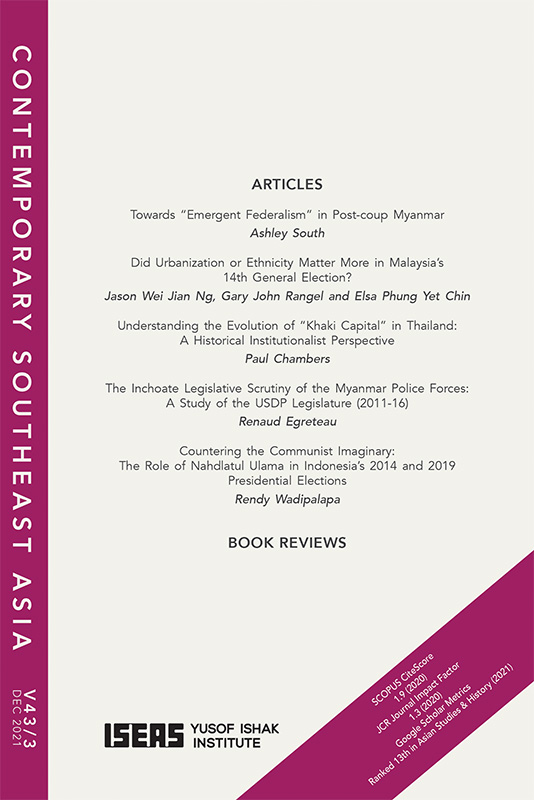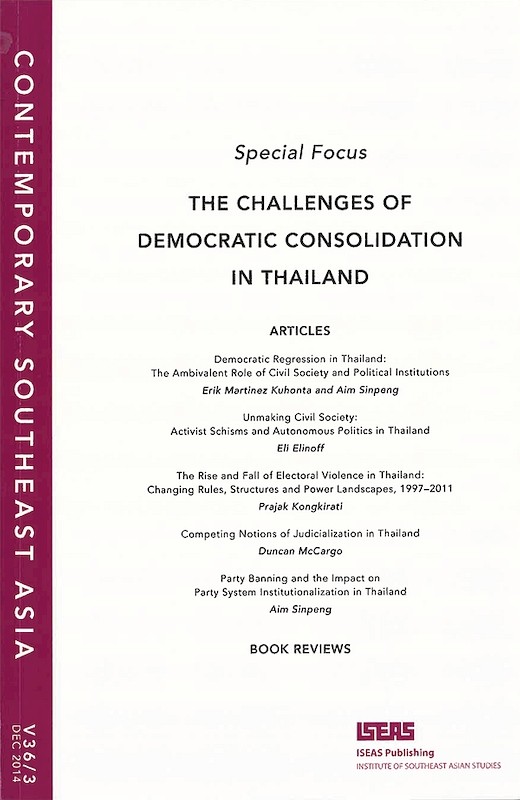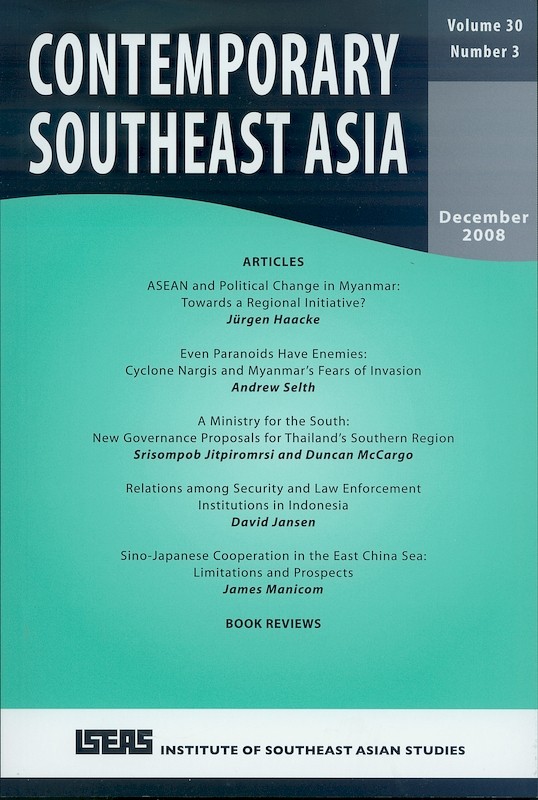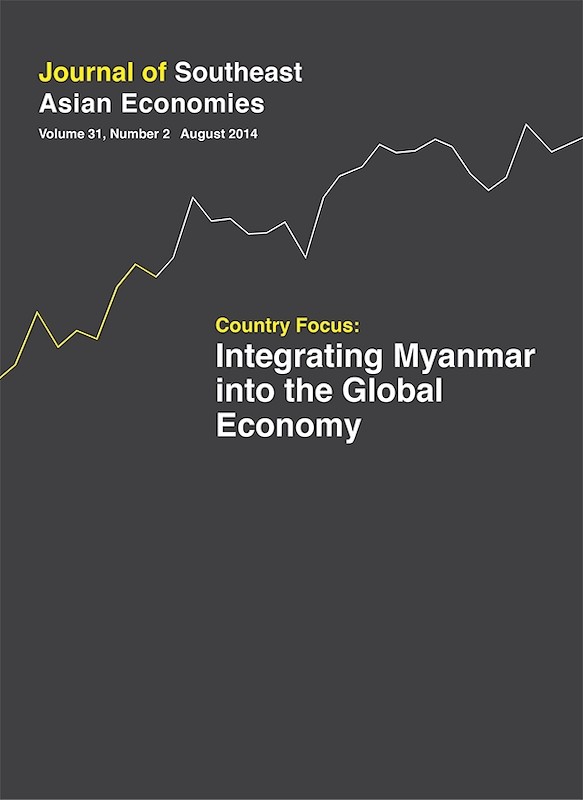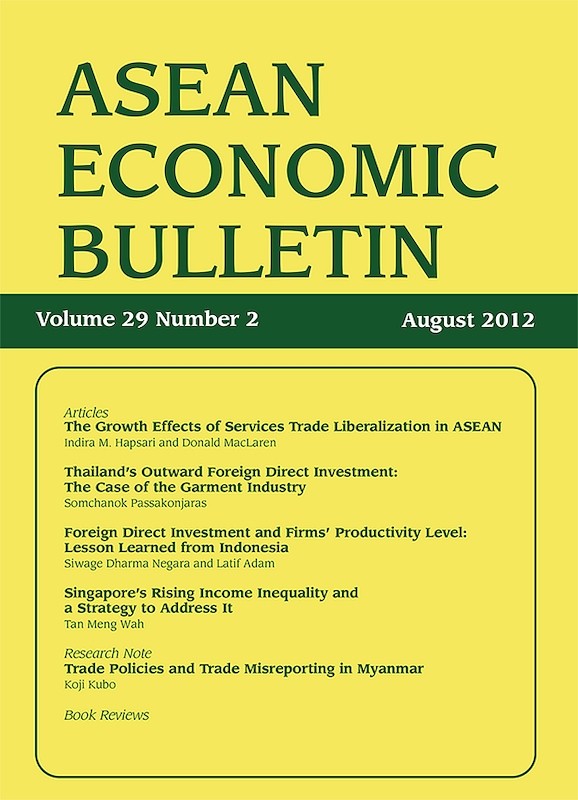Contemporary Southeast Asia Vol. 34/1 (Apr 2012)

Date of publication:
April 2012
Publisher:
Institute of Southeast Asian Studies
Number of pages:
144
Code:
CS34/1
Contents
-
Contemporary Southeast Asia Vol. 34/1 (Apr 2012)
[Whole Publication] -
Preliminary pages
- ARTICLES
-
The Perils of Incoherence: ASEAN, Myanmar and the Avoidable Failures of Human Rights Socialization, by Mathew Davies, author see abstractExplanations for ASEAN's inability to more successfully influence Myanmar over the last decade have shifted from accusations that the organization does nothing to live up to its on-paper commitments to the belief that what it does is wholly ineffective. The reasons for this ineffectiveness are found in the normative and institutional architecture of ASEAN, specifically its lack of punitive sanction-based compliance mechanisms. Through focusing on ASEAN's use of public pronouncements to express interests and desires, this article takes issue with such assertions. Specifically, ASEAN has been engaged in a strategy of rhetorical action to promote compliance with regional standards. To date it has been unsuccessful in that attempt not because of a lack of courts and commissions, but because it has been incoherent in its political strategy. At crucial moments ASEAN and its members remained more concerned with creating a unified position against external pressure than on developing a single policy towards Myanmar. This reaction fatally undermined the ability of ASEAN to influence Myanmar as it ensures the regime the continued external political cover from pressure that animated its desire to join ASEAN in 1997. This article suggests that correcting this shortcoming through the development of greater coherence is achievable within the existing ASEAN approach to managing regional affairs.
-
Foreign Investment in Myanmar: A Resource Boom but a Development Bust?, by Jared Bissinger, author see abstractBased on data for actual and approved Foreign Direct Investment (FDI) from 19892011, this paper explores the major trends in FDI in Myanmar, focusing on changes over time in the source and sector of investment. It argues that over the last decade Myanmar's inward FDI has become heavily concentrated in the extractive and power sectors, while investment in manufacturing, services and other secondary and tertiary sectors has been almost non-existent. This is mostly the result of a poor investment climate, including import and export regulations, a weak judicial system, currency controls and weak property rights. The paper shows that China, Hong Kong, South Korea and Thailand have been the main investors in Myanmar, while Singapore, India and Western countries invested little in the 2000s. This divergence is driven partly by the differing investment patterns of the source countries, yet also reflects commercial and geopolitical realities, sanctions and concerns over energy security. The paper then examines whether and how FDI can lead to economic development in Myanmar, and closes by discussing the importance of recent political and economic reforms for rebalancing Myanmar's FDI.
-
Myanmar's Police Forces: Coercion, Continuity and Change, by Andrew Selth, author see abstractMyanmar's police forces have received little attention over the years, but they have always played a critical role in the country's administration and national security. Since the 1962 military coup, the national police force has been overshadowed by the armed forces, but it has continued to evolve and grow. It is now larger and more powerful than at any time in the country's history, and is considered a key instrument of reform and control by the hybrid civilian-military government which was inaugurated in Naypyidaw in March 2011. This article aims to provide an introduction to this neglected subject. It sketches the historical development of the police as an institution from the beginning of the colonial period to the present day. It then outlines the current structure and organization of the Myanmar Police Force (MPF). This is followed by a discussion of eight broad themes that have characterized policing in Myanmar over the past 185 years. Finally, the article looks at some of the challenges facing the MPF and its likely future under the new government.
-
Politics, Business and the State in Post-Soeharto Indonesia, by Yuki Fukuoka, author see abstractIn Indonesia, democratic transition has led to the ascendance of business in the political arena. A growing number of entrepreneurs-turned-politicians have captured the power of office, taking over positions which had previously been held by bureaucratic elites. In the existing literature, the ascendance of politically assertive business, often through democratization, is associated with the emergence of a less interventionist state. However, despite the expectation that post-Soeharto Indonesia would embark on a swift process of change towards a regulatory form of state, the patrimonial features of the Indonesian state continue to display more fundamental continuity. This article presents an alternative framework through which to better understand changing state-business relations in Indonesia. The article argues that the fall of the Soeharto regime in Indonesia has had the effect of facilitating the transformation of the patrimonial state: from a patrimonial administrative state to a patrimonial oligarchic state. Democratization has changed the old hierarchy of state-business relations over the distribution of patronage. In post-Soeharto Indonesia, business elites are no longer dependent on bureaucratic elites, as the former now enjoys direct access to state resources.
-
Twin Coalition Politics in Malaysia since 2008: A Path Dependent Framing and Analysis, by Johan Saravanamuttu, author see abstractOn 8 March 2008 the opposition parties in Malaysia deprived the ruling National Front coalition of its two-thirds majority of seats and defeated it in five out of thirteen states it contested in. This result led analysts to suggest that electoral politics had breached a new watershed in Malaysia, and that it augured well for the development of a full-fledged two-party system. Political systems which feature electoral turnovers of ruling parties are seen by political scientists to be the sine qua non of democratic politics. This paper argues that March 2008 augurs the beginnings of a new path dependent emergence of a turnover electoral system in Malaysia. Path dependence theory could be used to explain why the National Front increasingly lost its "first-mover advantage" in electoral politics which for decades dominated political and economic institutions which reproduced the racialized political structures. March 2008 represents a rupture and departure from this earlier path dependence. Put differently, the National Front was not able to continue to reap "increasing returns" from its established electoral processes and institutions. This rupture has been reinforced by the fact that in the sixteen by-elections held after March 2008, eight were won by the opposition coalition of the People's Alliance (Pakatan Rakyat). It has become increasingly clear that newer forms of political processes and sensibilities are being introduced by the opposition coalition. This new trajectory is also one which puts the premium on participatory politics. Such a trajectory need not mean a departure from ethnicized politics but rather a political shift in the direction of more universal and democratic politics. The overall impact of this new path dependent process is the valorization of electoral democracy in Malaysia.
- BOOK REVIEWS
-
BOOK REVIEW: King Bhumibol Adulyadej, A Life's Work: Thailand's Monarchy in Perspective. Edited by Nicholas Grossman and Dominic Faulder, by Michael J Montesano, author
-
BOOK REVIEW: India as an Asia Pacific Power. By David Brewster, by Bronson E Percival, author
-
BOOK REVIEW: A Whole New World: Reinventing International Studies for the Post-Western World. By Pierre Lizee, by Shaun Narine, author
-
BOOK REVIEW: Where China Meets India: Burma and the New Crossroads of Asia. By Thant Myint-U, by Hnin Wint Nyunt Hman, author
-
BOOK REVIEW: Enemies of the People. Directed by Rob Lemkin and Thet Sambath, by Sophal Ear, author

